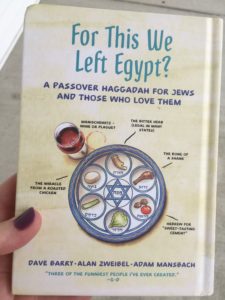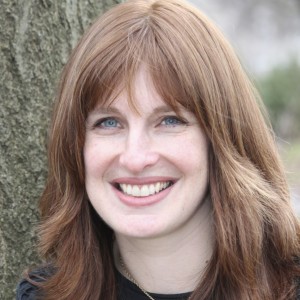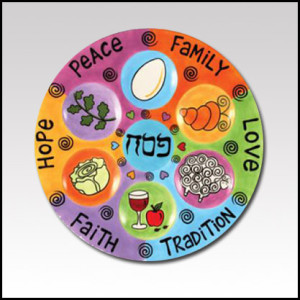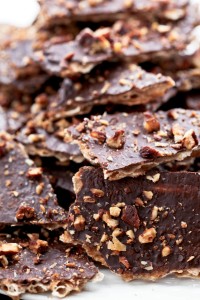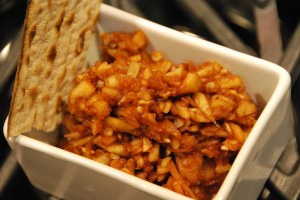Why is This Haggadah Different From All Other Haggadahs? Because It’s Funny!
As our Passover Seders evolve over the years, and our kids grow into adults, and the guest list has some new faces, so does our Haggadah. Haggadah means “retelling the story,” and it doesnt have to be the same long, boring version year after year like some of us remember from our childhoods, thank you Maxwell House. Perhaps it’s time to change things up a bit and try something new to guide us through the ceremony and full course meal that can last as long as the Exodus from Egypt. There are hundreds of Haggadahs to choose from with various themes, from social justice Haggadahs to the chocolate Haggadah (non edible) that addresses contemporary issues of slavery, economic justice and fair trade. But only one Haggadah is laugh out loud funny with all due respect to Moshe and the sancity of the Festival of Freedom.  It’s called “For This We left Egypt?” from the comic minds of Dave Barry (nationally syndicated humor columnist/author), Alan Zweibel (Saturday Night Live producer/writer), and Adam Mansbach (NY Times bestselling novelist/screenwriter),  a talented trio of wisecrackers who succeed in tickling our shank bone. Just in time for Passover, Zweibel will be sharing his Seder satire as part of the 39th annual St. Louis Jewish Book Festival, on Sunday March 18, at the JCC in Creve Coeur.
My Big Fat Orthodox Seder
Everyone, please welcome my guest blogger Ruchi Koval, who I met last month at the JWRP Leadership Conference, and we really hit it off! A mom of SEVEN, she is the creator of the humorous and insightful Out of The Orthobox, which teaches us about her Orthodox life in a spiritually uplifting, down-to-earth way that unites ALL Jewish women.
First, a bit about Ruchi:
Ruchi is co-founder and director of the Jewish Family Experience, a family education center and Sunday school located in Cleveland, Ohio. She is also a certified parenting coach, runs character-development groups for women, is a motivational speaker, and writes a popular blog on Judaism, www.outoftheorthobox.com. In her spare time, Ruchi enjoys reading, thinking about writing a book, putting on an Israeli accent, playing piano while singing loudly, and organizing closets. She does not enjoy cooking or sweeping her floors. Ruchi resides in her hometown of Cleveland with her husband and seven children.
Now here’s a peek into her Orthodox Passover seder: Continue reading
Passover: “Let My Son Go!”
As the eight-day festival of Passover comes to an end, I’m feeling kind of melancholy. Maybe its the matzo. Actually, it’s the last Passover before my son embarks on his Exodus from home to college.
As I reflect over the years of his childhood, I can’t help but wonder if I made the most of building his Jewish identity. Did I do a good job planting seeds of his heritage so that he’ll want to continue to nourish his spiritual self as a young adult, maybe even attend a few functions at the Hillel on campus with his peers? Did I make enough of an impact that he wants to continue the lessons from his ancestors of thousands of years with his own children? After all, that’s what keeps Judaism alive.
To be honest, I would be fooling myself (it’s April Fools Day) if I thought that I indeed succeeded in my job to teach him as best I can about his religion by celebrating every holiday—from Sukkot to Yom Kippur—in its full splendor.
I could have done more.
Sure, we acted out the 10 plagues during the seder, including ping pong balls for hail, red food coloring for blood, sunglasses for blindness, and we asked the four questions in English and Hebrew. But now it seems like everyone at the table wants to rush through the story, and the Haggadah is read halfway through.
I could have done more.
Sure, we lit the candles on Hanukkah, fried potato pancakes, and played dreidel, but it was the overabundance of presents that he probably remembers the most. We also celebrated with a stocking on Christmas morning—gasp!
I could have done more.
One year he helped us build a sukkah in the backyard, hammering the  lattice wall into the wood beams. We hung fruit and waved the lulav, but not every year. Baseball and soccer tournaments got in the way.
I could have done more.
On Shabbat, especially when he was younger, I made dinner, we said the blessings, and ate challah, but most Friday nights we didn’t because we had other plans or I was too tired to cook at the end of the week.
I could have done more.
And even though I would have liked him to experience Jewish summer camp and youth group, it wasn’t his thing, although he enjoyed playing baseball in Maccabi with other Jewish athletes from around the country.
I could have done more.
On the high holidays, he stayed home from school and got dressed in his button down shirt, pants, and uncomfortable loafers, so that we could attend services together as a family. Then high school came around, and it got harder to miss important assignments and tests.
I could have done more.
I missed the times we used to go to a neighborhood lake and throw breadcrumbs in the water on Rosh Hashanah to practice the ritual of tashlich. We set goals for the New Year, but didn’t get to cross them all off our list.
I could have done more.
He went to Jewish preschool, met Jewish friends, attended Sunday school, learned Hebrew, mastered his Torah portion, became a bar mitzvah, and even got confirmed. He loved chanting the Hebrew prayers and was so proud of himself. But like any language, if you don’t use it, eventually you lose it.
I could have done more.
At least he wants to go to Israel one day and experience what his homeland is all about. Maybe he will connect with his culture and make new Jewish friends. Maybe he will learn to like falafel. Maybe not.
Even though I could have done more, I couldn’t be more proud of my son and the young man he is today. As he wraps up his senior year, he is so ready to leave home and tackle his new life in college.
Of course, I could have done more when it comes to his Jewish upbringing. But maybe I did enough.
He knows he always has a place to call home. He knows his family loves him.
And I promised him that next year if he comes home for Spring break, I will make him his favorite dishes. Charoset and chocolate matzo. Talk about Jewish guilt…
Your Passover Journey Begins Here
An accomplished singer/songwriter, educator and community organizer, Peri Smilow promises to take women of all ages and denominations on a spiritual journey they will never forget. Her music and message of tikkun olam has been heard worldwide; on March 12, she will perform at Nishmah’s annual pre-Passover extravaganza. It features music, food, learning and even shopping for Judaica items crafted by local designers.
Along with recently completing a national tour of her new cabaret act “Peri Smilow Sings the Great (Jewish) American Songbook,†this New Jersey-bred mom is a cantor, Harvard University graduate, social activist and an educational consultant. At the Nishmah event—which is a fun girl’s night out for moms and their daughters—Smilow will use her passion for Judaism, particularly the Passover holiday, to inspire women to immerse themselves in their Jewish identity and learn how to create a memorable seder that casts them in a central role.  She recently took time out to answer a few questions before her stop here.
How would you describe your music?
It is contemporary Jewish. There are only a handful, maybe 50 or a 100, people in the world writing this kind of music. We use important intellectual and spiritual themes of Jewish people, often singing in Hebrew and English, and set it to music of our contemporary times. I call it “Nusach America,†which is the sounds of the traditional chanting of our people and America because the new melodies are reflective of the sounds of popular music in this country.
How do you incorporate social justice into your music?
I use Jewish teachings to deepen our understanding of our obligation to social justice. I want people to feel good about their Jewish roots, think more deeply and learn how they can be more impactful in the world.
This year’s social action project at the Nishmah event is about microlending, or giving small loans to poor people to alleviate poverty. Why is this important for Jewish women to be involved in?
This microlending project engages the St. Louis community about their role in helping Jewish women around the world. There is something about the dynamic of being expected to pay the money back that lifts people out of poverty. Each woman who receives a loan chooses where the money goes, which puts the control in her hands, and this is a very important tool for taking people out of poverty. Also, microlending is doable, manageable, and lots of people can afford to give $25. (That’s) a lot of money for a woman in Cambodia and can mean the difference between eating and not eating.
How do you inspire girls and women to take an active role in the Passover seder?
At the Nishmah event, I lead a program that is built around the framework of an actual seder. We will sit at round tables and talk with one another like at a family seder. We will share important dialogue about the role of women in Jewish life. We will get a chance to exchange ideas and recipes, but we will also go much deeper than that. The goal is for women to not have to be in the kitchen preparing, but to be seated at the table enjoying the seder.
Why is it important for Jewish women of all backgrounds to learn from each other?
This Nishmah event is different from any other seder because it is the most inclusive women’s seder in America. We have Reform, Conservative, Orthodox and Chabad women celebrating together, and that does not happen in this country. Over the last several months, a great deal of work has gone into planning this program, allowing women from various denominations to highlight their experiences from their own Passover seders. I’m so excited to have Hasidic women join us; it’s like a cross-cultural experience even though we’re all Jewish. It’s called “Klal Yisrael,†which means we’ll have women in the room that night who represent every corner of the fabric of our people, all of Israel.
Describe how Nishmah’s pre-Passover experience relates to the story of Exodus.
We are basically Jews celebrating Passover in the framework of a seder, and we are reenacting the ancient journey through the dessert from slavery to freedom. If I do my job as the ringleader, the emcee, the train conductor, the journey leader, the women will feel like they have been on an extraordinary journey. We sing, we eat, we dance, we create, we talk, we explore, we question. We will do all those things at the JCC.
Why is it important to have programs like this for girls and women?
First of all, I’m a girl. Second of all, I’m a mom. And third of all, I’m a daughter. I connect with women and girls, naturally.  The thing about Passover is that in most generations, even post-ERA, women spend most of Passover preparing, getting food ready and taking care of kids. This event allows us to have our (behinds) in the seats and relaxing. In the Haggadah, we are supposed to be leaning on a pillow. This Passover seder allows women to sit and relax and think and reflect, which is critically important because all that reflection comes back into their homes and families. This event shows women how to be full contributors to their seders in a way that often we are not.
Does your family share your love for music?
Yes! I married into a musical dynasty. My husband is a NY1-TV Senior Correspondent and a former Kutz Camp song leader for NFTY (National Federation of Temple Youth). His brother Doug Mishkin is a lawyer and a well-known singer/songwriter of music in the Reform movement. My daughter also sings, and plays piano and violin. But she is a typical 9-year-old and doesn’t like when mom sings. She prefers to listen to Taylor Swift.
Your most recent release, “Blessings,†which was co-produced by Grammy-Award winner Ben Wisch, draws on your experience as a two-time cancer survivor, wife and mother. How has cancer changed your life?
I think that having experienced cancer has deepened my desire and drive to make a difference in this life. Cancer is a reminder that we have no promise about how long we have to be here. I really want to make every single day count and one way I’m doing it is by participating in Nishma’s pre-Passover event. I’m so looking forward to celebrating with the women in St. Louis.
Magical Cup Invites Elijah to Your Seder
Each year at Passover time, my goal is to learn something that I didn’t know before and pass that new tradition on to my children so that they better understand their own heritage. In other words, I want them to appreciate who they are and where they’ve come from as Jews. After all, “Whoever expands on the Passover telling is to be praised,†said the Jewish sages, and I need all the accolades that I can get. Continue reading
Passover Storytelling Goes Beyond the Haggadah
Passover is all about telling (or retelling) a great story. The Passover story, in particular, is about the history of our people. The story starts out thousands of years ago when the Jews were slaves and built ancient cities for Egyptian kings called Pharaohs. The Egyptians were worried that the Jewish slaves would become too strong and fight for their freedom, so Pharaoh ordered the drowning of all male babies born to the Jews. To save her newborn son, one Jewish woman placed her baby in a basket and asked her daughter Miriam to take him to the reeds in the river and hide him. Pharaoh’s daughter found the baby and named him Moses, which means “drawn from the water,†and unknown to the princess, appointed Moses’ real mother to care for him while he lived in Pharaoh’s palace.
Sounds like a soap opera, doesn’t it? Continue reading
Passover Is All About Evolving Traditions
Passover is a favorite Jewish holiday. Think about it—adults eat all night long if they want, and the kids are allowed to literally act like animals at the table. I’m referring to the 10 plagues, of course. In my family, the Seder is simply not complete without farfel and frogs. online pharmacycialislevitrasomaviagra
Continue reading
Omer Bridges Passover And Shavout
Before you throw away the box of leftover crumbled matzah, just keep in mind that the Jewish journey to Sinai isn’t over yet. Sure, we can eat bagels once again, but we also have many more opportunities to learn about our history before the next major festival Shavuot gets here. Continue reading
Lotsa Matzah Tempts Your Tastebuds
Welcome to Passover, a seven-day matzah festival in which Jews everywhere remember their history of slavery and celebrate their freedom by concocting appetizing ways to eat the plain crackers for an entire week. And like every other symbolic Jewish food, matzah has a dramatic story behind it. Continue reading
Passover Seder Caters to Child’s Curiosity
You know how little kids ask their parents “why†all the time? Everything is a question. Why is the sky blue? Why do I sleep with my eyes closed? Why is applesauce mushy? Why is your name mommy? When we give them an answer, they usually follow up with another “why†all over again. This unending conversation can drive a parent crazy.
In Judaism, the curious child in all of us keeps our religion alive. This lesson is never more clear than at Passover, also known as “The Festival of Spring†or “The Season of Our Freedom†or “The Festival of Unleavened Bread,†or Pesach for short. Continue reading
